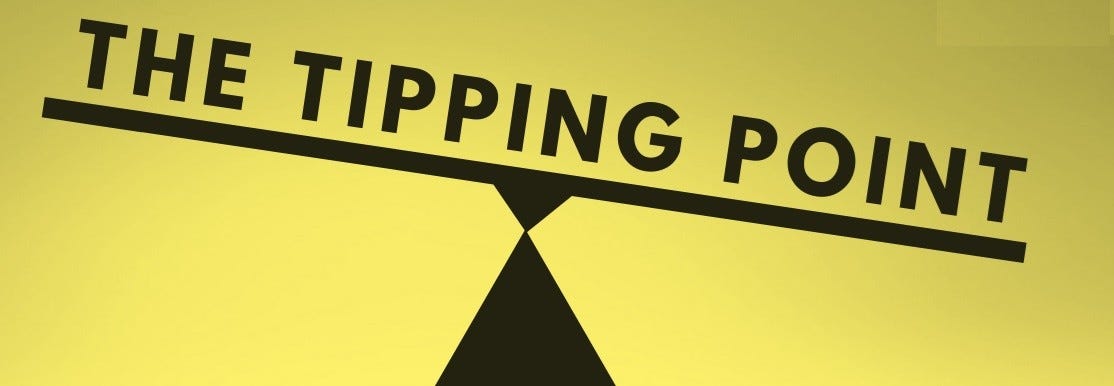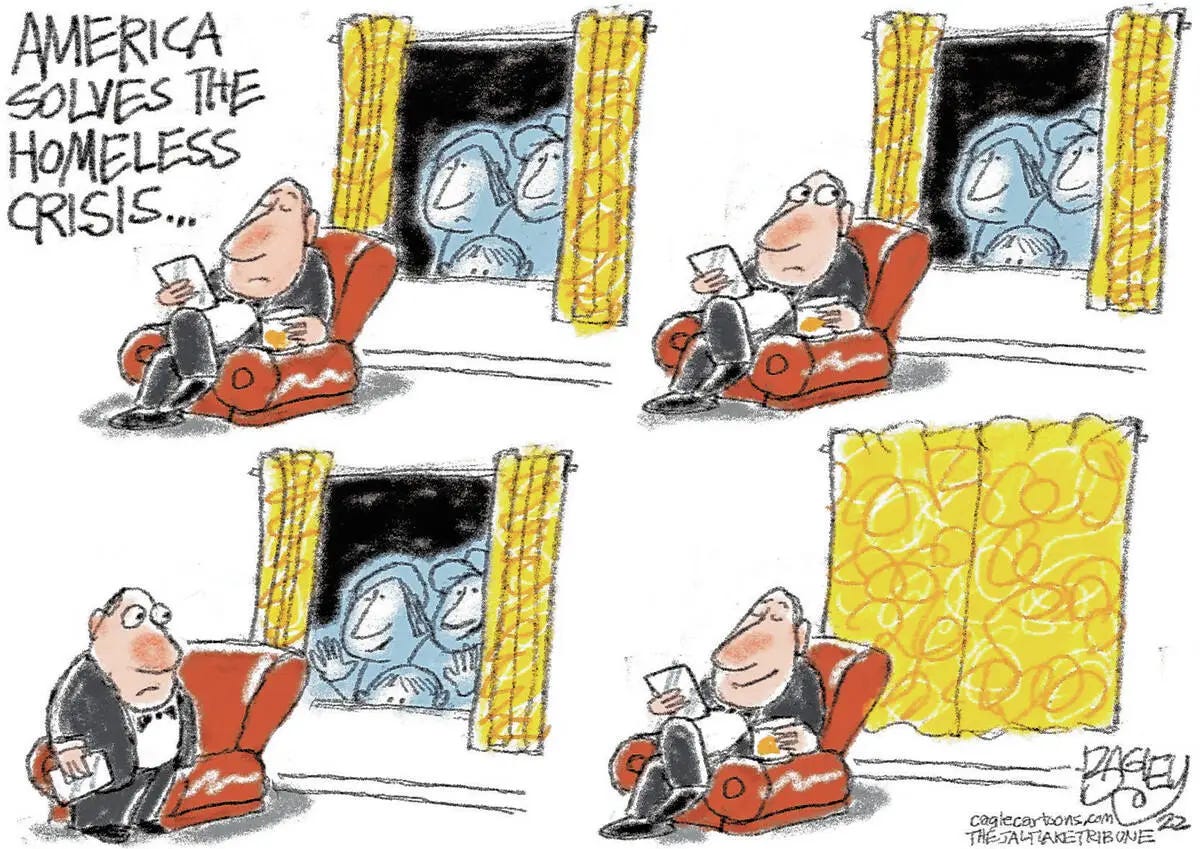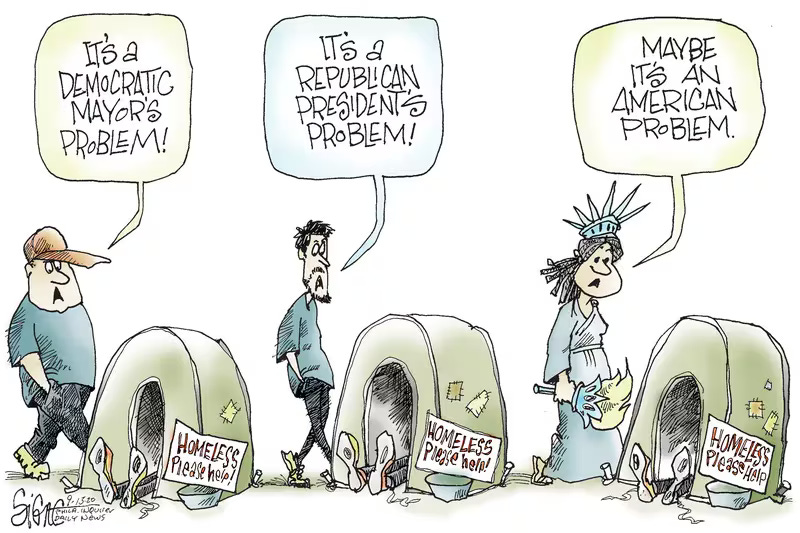The Houselessness Tipping Point: Which Side Will We Choose?
Houselessness in the nation has reached a tipping point, so the question is which side will we tip over into, the side that supports our fellow human beings or the side that harms them.
Author Note: The following article was recently published in the Sunday, July 28, 2024 Edition of The Des Moines Register, an Iowa newspaper. Although I no longer live in Des Moines, Iowa, I was inspired to say something because of the language the city has been using since the Supreme Court ruled that people can be fined and jailed for sleeping on public property. Despite the Des Moines focus, I believe that this article is applicable to communities throughout the country and includes examples from other communities. This version of the column has been expanded upon, containing some additional language and information. You can find the original piece here.
“In the United States, when you are no longer useful, you are disposable: The Homeless, Free Blacks, Elderly People, Older Women, the Indigenous, Poor, Disabled, etc.”
Joshua V. Barr
Des Moines, Iowa Councilmember Chris Coleman recently stated that the city has reached the tipping point regarding the situation of houseless persons. If Des Moines has reached the tipping point, they need to decide on which side are they going to tip over into. As a society, we have indeed reached a tipping point regarding the direction we want to go as a nation. It is time for us to decide what kind of nation and people we want to be. Do we want to be a nation that cares about humanity or one that values profit and anything that could affect that more?
The recent US Supreme Court rulings have clearly demonstrated that their motto is profit for the powerful over everything, people and planet be damned. Their actions have gotten so out of touch that President Joe Biden has stepped in to suggest new checks on the court. During its 2024 session, the Supreme Court legalized punishment for houselessness even if there are no spaces in shelters. One thing we must all come to understand one day is just because something is legal doesn't make it right, just, true, or fair. And just because the Supreme Court ruled this way does not mean that Des Moines, or any other city, had to immediately consider an ordinance punishing houselessness rather than coming up with a comprehensive plan to address the issue. This is bigger than a legal issue, it's a moral one, and we need to act with urgency and compassion.
“Politics will always falter at the point where real money is needed to solve real problems.”
from We Own This City
Time and time again, the Des Moines City Council has demonstrated that when they want to support an initiative, they can find the money. They found money for the Birdland Park renovation ($54 million), the City continues to find money to increase the policing budget, and the City even found money to create a non-profit, Invest DSM, to improve properties and property values in specific neighborhoods ($25 million over ten years). But when given an opportunity to simply change a zoning ordinance to modify an existing facility so a charity could create an affordable housing recovery center for up to 12 men, a minority of city councilmembers blocked it, siding with the “not in my backyard” cries of the adjacent neighborhood. NIMBYism at its finest. They fail to realize that you can't invest in neighborhoods and buildings and not also invest in the people. It's the people who are the lifeblood of our communities that make our investments worth it.
If this is truly a tipping point, we cannot fine and arrest our way out of this problem. Coleman stated that the city needs a strategy, but fines and punishment are not a strategy; it is merely kicking the can down the road for another generation to address. It’s time to stop kicking the can down the road and pick it up. Sure, we didn't put the can there, but it is now our responsibility. Our ability to respond to the challenges within our community demonstrates what is truly important to us. The test of all humans is in their immediate actions, not their ultimate sentiments. If we have the ability to require houseless persons to do community service, then we also have the ability to find community work for them to engage in so they can obtain housing.
“Stable Housing Creates Stable Communities”
Joshua V. Barr
There is a wealth of examples of cities larger than Des Moines that have made significant strides in reducing houselessness. Houston, Texas, the fourth most populous city in the US, has seen a remarkable 63% reduction in their houseless population (and eliminated veteran houselessness) by overhauling its system and embracing the Housing First principles. In Bakersfield, CA, they reduced their houseless population to less than 0.1% by creating a database of houseless persons and using the data to address the specific needs of those persons with partner agencies. The entire state of Utah reduced its houselessness population by a staggering 91%, using the Housing First principle, putting people in houses first before requiring them to get other treatments. These success stories and many others should serve as a beacon of hope, demonstrating that with creativity and community, we can address the houselessness challenge and create stable communities by providing housing to those in need. It's time for Des Moines and other cities around the country to tap into their innovative and creative potential regarding houselessness and overcome its poverty of imagination.
The human brain is a problem-solving machine. The only problems humans don't solve are the ones they don't want to solve because the solutions are inconvenient. If this is our tipping point, we must decide: humanism or capitalism? Lock up or a hand up? Contempt or compassion? Property values or valuing people? How do we want the city to utilize its federal Community Development Block Grant (CDBG) funding and other federal dollars that were created to address housing issues?
Des Moines has chosen not to expedite the ordinance and is requiring three readings before the ordinance goes into effect (the first reading passed 5-2), but this is not a time for complacency. If you disagree with the ordinance, it's crucial that you reach out to your city council members. As someone who has worked in government, I can attest that it's the conversations before and after the official meetings that carry the most weight. Your engagement is not just important, it’s integral to the solution. Let your council members know that we should not be criminalizing people for their lack of housing; instead, we should be assisting them in securing housing. As the issue of houselessness continues around the country, I am still hopeful that the scale will tip in favor of humanity, but this can only be achieved if our voices are heard, coming up with new ideas and ways of thinking to assist those who need us most.
"This country will not permanently be a good place for any of us to live in unless we make it a reasonably good place for all of us to live in."
Teddy Roosevelt
The Last Word: George Carlin (explains why I use the word houseless)
This Week’s Challenge:
Your community receives Community Development Block Grant (CDBG) funding from the US Department of Housing and Urban Development (HUD) to support the creation of viable communities by providing funds to improve housing/living environments and expand economic opportunities for persons with low and moderate incomes. The funding is so flexible that it can be used towards youth programs and employment to give youth city jobs that contribute to their personal and collective development. To which communities are your CDBG funds going in your area? Research what your community is doing with your tax dollars.
Song of the Week: This House by Tracie Spencer




Joshua, I too just started my Substack journey. My first official post comes out tomorrow! Thank you for highlighting the situation and challenging all of us to seek solutions. Keep speaking up and shining the light where it needs to shine.
Tony Wilson